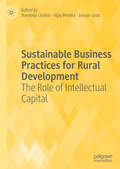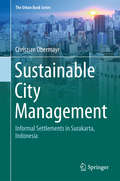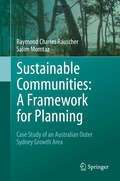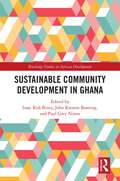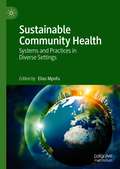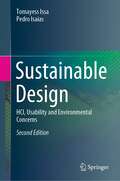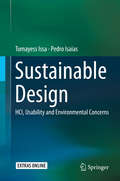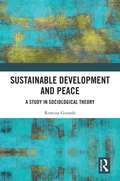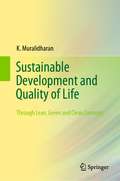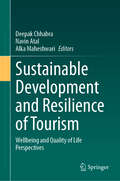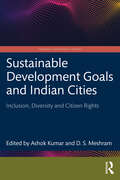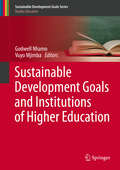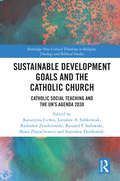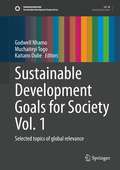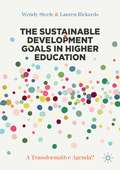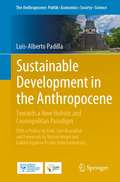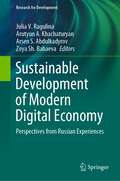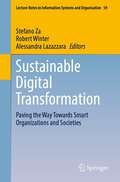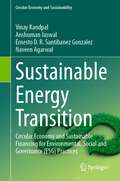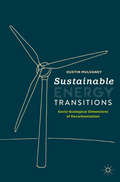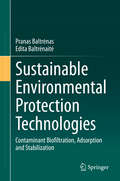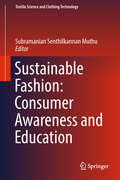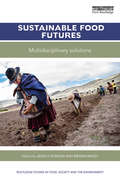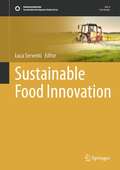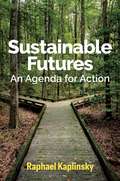- Table View
- List View
Sustainable Business Practices for Rural Development: The Role of Intellectual Capital
by Hardeep Chahal Vijay Pereira Jeevan JyotiThe book includes empirical research papers and case studies embracing human capital, relational capital and structural capital in context to services and manufacturing sectors. It will highlight on the sustainable business practices manifested in the work culture, values and beliefs in context to rural regions. From a learning and managerial perspective, the book will identify effective business practices in varied service and manufacturing sectors significant for sustaining business performance and competitive advantage.
Sustainable City Management
by Christian ObermayrThis book analyses the housing and governance policies of the city of Surakarta, in Indonesia. It addresses the question of whether Surakarta's strategy for handling the city's informal sector and marginal settlements shows evidence of sustainability and good governance. The book illustrates current trends in urban development and discussions on effective strategies for improving living conditions in slums on both a global and national scale. Using four main programs as examples, it presents a detailed overview of Surakarta's housing policies regarding the poor. It critically evaluates the city's relocation measures and shows that Surakarta's city government has put into place an effective policy, reaching the poor by inclusive approaches. Influenced by global discussions and best practices, the programs examined are characterized by elements of good governance and Solo's strategies have already been disseminated to other Indonesian cities. However, the book argues that deficits remain regarding participation and transparency. The work is based on Christian Obermayr's outstanding Master's thesis, defended in 2013 at the University of Innsbruck, Austria.
Sustainable Communities: A Framework for Planning
by Raymond Charles Rauscher Salim MomtazThis book is in part a response to the attempts of governments to address increasing concerns over such environmental issues as the impact of climate change; carbon emissions; pressures from overpopulation of cities; coal seam gas extraction and depleting natural resources. The authors have developed a Sustainable Communities Framework (SCF) which incorporates social-cultural, environmental and economic sustainability principles in the process of urban planning. The authors propose a five-step SCF built on an application of sustainability tables. The book examines a wide range of urban planning practices utilizing sustainability criteria, outlining both qualitative and quantitative tools. Separate chapters discuss application of the SCF to both the natural environment and the built environment. This framework is applied to a case study of the outer Sydney growth area of Wyong Shire, Central Coast, NSW, Australia. Addressing the question of how best to measure the environment, the authors present a table for selecting indicators of sustainability, and outline sustainability scorecards which use color-coded ratings of green, red and amber to measure indicators of sustainability. The authors show how aggregating these ratings allows the framework to be scaled up for application to larger areas. Finally, the authors show how scorecards can be incorporated in sustainability reports, with actions and monitoring components. The authors also examine urban planning education including land use planning, natural resource planning and sustainable urban planning, focusing on the extent to which schools incorporate principles of sustainability. The authors offer their critique on the movement of planning practices towards a more coordinated and holistic framework, in incorporating sustainability principles. Sustainable Communities: A Framework for Planning concludes by drawing a future scenario on the application of the SCF to incorporate principles of sustainability into urban planning. The authors propose future options for SCF applications, including adopting a systems program; environmental performance monitoring and showing how the framework will accommodate the social-cultural and economic components of sustainability, in addition to the environmental ones as examined in the case study.
Sustainable Community Development in Ghana (Routledge Studies in African Development)
by John Kwame Boateng Isaac Kofi Biney Paul Gary NixonThis book explores sustainable community development in Ghana post-COVID-19, highlighting examples of how individuals facing extreme challenges have adapted to their changing circumstances.Through the voices of African researchers, it explores the different responses that local, subnational, and national stakeholders and communities initiated to preserve the gains made in achieving the Sustainable Development Goals in Ghana during the global pandemic. This collection considers how policy makers are tackling the pressing issues of sustainability, climate change and its effects on Africa and Ghana in particular, and multi-stakeholder policy responses to building communities in a post-COVID-19 world. The case studies show how communities are interacting to ensure sustainable community development and learning in the Global South, and the role that education and learning, both formal and informal, play in strengthening livelihoods, choices, and opportunities in African communities.An assessment of multi-stakeholder policy responses to building communities in Ghana, this book will be of interest to scholars and students in the field of Education, Education Management, Sociology, Economics, and African Studies. It will also be of interest to policy makers and practitioners engaged in community development programmes and activities and the development of associated policies.
Sustainable Community Health: Systems and Practices in Diverse Settings
by Elias MpofuApplying a trans-disciplinary approach, this book provides a comprehensive, research-based guide to understanding, implementing, and strengthening sustainable community health in diverse international settings. By examining the interdependence of environmental, economic, public health, community wellbeing and development factors, the authors address the systemic factors impacting health disparities, inequality and social justice issues. The book analyzes strategies based on a partnership view of health, in which communities determine their health and wellness working alongside local, state and federal health agencies. Crucially, it demonstrates that communities are themselves health systems and their wellbeing capabilities affect the health of individuals and the collective alike. It identifies health indicators and tools that communities and policy makers can utilize to sustain truly inclusive health systems. This book offers a unique resource for researchers and practitioners working across psychology, mental health, rehabilitation, public health, epidemiology, social policy, healthcare and allied health.
Sustainable Design: HCI, Usability and Environmental Concerns
by Pedro Isaias Tomayess IssaThis book is concerned with the importance of Human Computer Interaction (HCI), Usability, user participants, and Sustainability in the Information Communication Technology (ICT) industry throughout the world. ICTs have become a crucial instrument for communication, entertainment, commerce and research and this increased usage is presenting new environmental and sustainability issues as we try and meet the ever-growing needs of both businesses and individuals. Sustainability and sustainable design must become central to the design of new technologies to make a concerted effort to tackle the environmental concerns we face now and in the future. Development frameworks, tools and models are used and explored, and the New Participative Methodology for Sustainable Design (NPMSD) is introduced as a way of identifying key factors needed in developing more sustainable systems including new smart technology and portable devices.In this book, the sustainable step in the design stage is evaluated and assessed by 11 countries: namely, Australia, Brazil, China, Germany, India, Norway, Singapore, South Korea, Sweden, UK, and USA. The new results are generated confirming that sustainable design awareness should be considered by designers, and users to minimize and reduce the carbon emissions, raw materials usage, and global warming, since these problems should be tackled soon, otherwise, it will be too late to solve it. Further research is needed in the future to implement and assess the sustainable design step with large IT companies to ensure compliance with environmental standards and rules for sustainable systems.Sustainable Design is an invaluable resource for students and researchers, designers and business managers who are interested in the human-centered, environmental concerns of sustainable technologies.
Sustainable Design
by Tomayess Issa Pedro IsaiasThis book is concerned with the importance of Human Computer Interaction (HCI), Usability, user participants, and Sustainability in the Information Communication Technology (ICT) industry throughout the world. ICT has become a crucial instrument for communication, entertainment, commerce and research and this increased usage is presenting new environmental and sustainability issues as we try and meet the ever growing needs of both businesses and individuals. Sustainability must become central to the design of new technologies to make a concerted effort to tackle the environmental concerns we face now and for the future. Development frameworks, tools and models are used and explored and the New Participative Methodology for Sustainable Design (NPMSD) is introduced as a way of identifying key factors needed in developing more sustainable systems including new smart technology and portable devices. It is hoped additional research will be carried out in the future to assess these sustainable design steps using larger, more diverse countries with developed and developing economies to further refine such methods. Sustainable Design will be an invaluable resource for students and researchers, designers and business managers who are interested in the human-centred, environmental concerns of sustainable technologies
Sustainable Development and Peace: A Study in Sociological Theory
by Romina GurashiThis book explores the growing attention that sociology has started to give to environmental issues in terms of peace and social justice. With a focus on sociological theory and its development, it reconstructs the long journey made by the social sciences towards the reconstruction, in a single theoretical paradigm, of the problems associated with the implementation of conditions of peace and sustainability. Beginning from the premise that environmental issues are never purely environmental, but entail political, economic and social implications, Sustainable Development and Peace offers an understanding of where we are heading and how, reflecting on present challenges and possible directions for the future. It will, therefore, appeal to scholars of sociology, social theory, development studies, politics and environmental studies.
Sustainable Development and Quality of Life: Through Lean, Green and Clean Concepts
by K. MuralidharanThis book aims at sensitizing readers towards sustainability and encourages them to understand the importance of lean, green and clean (LGC) issues pertaining to everyday life. The necessity of measurement-based evaluations, statistical significance of material use, and energy are discussed. The book focuses on the importance of climate change issues and environmental concerns associated with lean production and manufacturing. Emphasis is laid on understanding and applying the concepts of quality through project management and measurement based assessment methods. A wide range of audience, including students, teachers, quality professionals, management consultants, lean and Six Sigma practitioners, will find this book valuable.
Sustainable Development and Resilience of Tourism: Wellbeing and Quality of Life Perspectives
by Deepak Chhabra Navin Atal Alka MaheshwariThis volume examines progress in sustainable and resilient development of niche forms of tourism from a health and wellbeing perspective. It also aims to offer deep and innovative insights on the supporting role of non-pharmaceutical interventions to enhance resilience and wellbeing of visited and visiting communities. A comparative and critical discourse of the role of hard medicine is also offered, from both a core and supplementary perspective, particularly, from eudaimonic and physiologically restorative standpoints. Furthermore, indigenous non-pharmaceutical interventions and spiritual healing mechanisms are discussed in the context of their potential to facilitate long term immunity and happiness. The book conceptually situates health as a fourth pillar of sustainability, and examines its role in stimulating long-lasting transformations rooted in positive psychology, inner transformation and sustainable consumption of organic productsand services. It designs an evolving transformational ‘Quality of Life’ paradigm that strengthens the foundations of health/wellbeing-based sustainable development initiatives and resilience of tourism systems. The work will be of interest to academic, professional, and various public and private stakeholders of tourism such as destination marketing organizations, policy makers, hospitality industries, tour operators, host communities, NGOs, and government agencies.
Sustainable Development Goals and Indian Cities: Inclusion, Diversity and Citizen Rights (Towards Sustainable Futures)
by Ashok Kumar D. S. MeshramThis book critically examines Sustainable Development Goals and cities in developing countries with special reference to climate change, inclusion, diversity, and citizen rights in India. It discusses global issues of sustainability and climate change in the context of rapid urbanisation and focuses on the role of equitable and just processes of urban development aimed at protecting social diversity, redeeming natural environments and, pursuing economic growth geared towards improving the quality of life. The volume looks at the nature of opportunities and future challenges presented to cities and codifies ways to transcend these. It explores key themes such as mitigation of risks from heat island effects, devastating floods, and extreme weather events like droughts; improvement of air quality; compact development; reduction in urban sprawl and protection of agriculturally productive lands for long-term food security; growth of small and medium towns; protection of rural landscapes; access to basic services like water sanitation, primary education, and housing; protection of forest and green spaces for the conservation of biodiversity; renewable energy sources; enhancement of mobility through efficient public transit systems like metro systems or suburban rail; effective and equitable governance for the vulnerable; balanced regional development; inclusive human development; securing the right to the city; and climate risk and resilience. Based on new research and data presented by global experts on climate change and sustainability, this book advances multiple discourses of sustainable urbanisation by connecting social challenges such as democracy, equity, diversity, and inclusion to create an enabling environment for a better future for cities in the developing world. Lucid and topical, this book will be useful to scholars and researchers of urban studies, urban planning, development studies, sociology, public policy and administration, political sociology, city studies, geography, architecture, and economics and also to professionals and NGOs.
Sustainable Development Goals and Institutions of Higher Education (Sustainable Development Goals Series)
by Godwell Nhamo Vuyo MjimbaThis volume brings together both theoretical and case study based contributions to the implementation of the Sustainable Development Goals (SDGs) in Institutions of Higher Education (IHE), presenting an impactful combination of authors from both developing and developed countries. While most current publications addressing the SDGs and education focus on sustainable development in general and specific topics such as climate change or energy, this book attempts to accelerate the localisation of the SDGs by presenting opportunities and innovations offered in various universities and campuses regarding SDGs localisation. The book seeks to provide an important contribution to the global dialogue on IHE and the SDGs, and will be of interest to academics and researchers engaged in the SDGs and education, as well as government agencies and other interested stakeholders. The book focuses on curriculum and learning matters, research and development as well as community engagement. Case studies detail the integration of SDGs in academic and professional development, new approaches to implementing sustainability science instruction, improvements in teaching practices to enhance teacher competence, and responsible management education. Additional focus is placed on the alignment of the SDGs in higher education with the other goals, emphasizing technological innovation for improved human health and environmental management, and climate change policies and action plans. Interdisciplinary solutions for pressing environmental problems are also provided, making sure that no one is left behind in realising these global development goals.
Sustainable Development Goals and the Catholic Church: Catholic Social Teaching and the UN’s Agenda 2030 (Routledge New Critical Thinking in Religion, Theology and Biblical Studies)
by Katarzyna Cichos Jaros 322 Aw A. Sobkowiak Ryszard F. Sadowski Beata Zbarachewicz Rados 322 Aw Zenderowski Stanis 322 Aw Dzieko 324 SkiThis book identifies both the consistencies and disparities between Catholic Social Teaching and the United Nation’s (UN) Sustainable Development Goals (SDGs). With Pope Francis’ Laudato si’ encyclical, Catholicism seems to be engaging more than ever with environmental and developmental concerns. However, there remains the question of how these theological statements will be put into practice. The ongoing involvement of the Catholic Church in social matters makes it a significant potential partner in issues around development. Therefore, with the use of the comparative method, this book brings together authors from multiple disciplines to assess how the political and legal aspects of each of the UN’s 17 SDGs are addressed by Catholic Social Teaching. Chapters answer the question of how the Catholic Church evaluates the concept of sustainable development as defined by the Agenda 2030 Goals, as well as assessing how and if it can contribute to shaping the contemporary concept of global development. Examining the potential level of cooperation between the international community and the Catholic Church in the implementation of the Agenda 2030 Goals, this volume will be of keen interest to scholars of Catholic Studies, Religious Studies and the Sociology of Religion, as well as Environmental Studies and Development Studies.
Sustainable Development Goals for Society Vol. 1: Selected topics of global relevance (Sustainable Development Goals Series)
by Godwell Nhamo Muchaiteyi Togo Kaitano DubeWritten by 43 authors from Africa, Europe and Latin America, this book presents 19 topics addressing poverty in the context of Sustainable Development Goals (SDGs), leadership in implementing SDGs, and SDGs in service delivery and local government. As the world has gone past five years of implementing the 2030 Agenda for Sustainable Development and the intertwined 17 SDGs, new opportunities in research continue to open up. Hence, documenting some of the initiatives put in place around the world regarding the implementation of the SDGs is one of the aims of this publication. With 10 years remaining, the book further enhances the desire to scale up SDGs implementation. The selection of case studies from the selected regions also provides a balance in terms of how the SDGs are being rolled out for economic growth, environmental stewardship and social protection. The ambition remains even with the challenge brought by the COVID-19 pandemic that preoccupied the whole of 2020; spilling over to 2021. There is no doubt that resources have been diverted, but the world must stay on the course to 2030 and beyond. Therefore, the book is relevant for several stakeholders including the academics, development partners, government officials and other individuals that are involved in making sure no one is left behind in the lead to 2030.
The Sustainable Development Goals in Higher Education: A Transformative Agenda?
by Wendy Steele Lauren RickardsThis book explores the role universities have to play in fulfilling the Sustainable Development Goals (SDGs). At the heart of “sustainable development” is the legacy of unsustainable development with its roots in modernity and colonialism. Critical engagement with the SDGs involves recognising these roots are shared by universities and the reciprocal need for maintenance, repair and regeneration. Universities are not just enablers of change, but also important targets of change. By focusing on the role of education about, for and through the SDGs, the authors seek to advance critical engagement with higher education that is both progressive and meaningful. We are all responsible for bearing witness to our age. This book will appeal to all those who hope that more sustainable future worlds are still possible.
Sustainable Development in the Anthropocene: Towards a New Holistic and Cosmopolitan Paradigm (The Anthropocene: Politik—Economics—Society—Science #29)
by Luis-Alberto PadillaIn the Anthropocene sustainable development responds to socio-economic, environmental and political crises provoked by humankind due to global warming and the great acceleration of human intervention in ecosystems. This book introduces readers to current debates on sustainable development and to a holistic and multidisciplinary approach. Regional integration and supranational institutions are fundamental for sustainable development. The democratisation of the international system requires a new multilateralism. Global problems of demography, economic ideology of unlimited growth, the prevailing technocratic paradigm, consumerism, problems of waste, fossil fuels, industrial food production, use of fertilisers, water management and climate change are discussed, and the importance of multilateral agreements for security, sustainable peace and development is explored. This planetary crisis may be solved by international cooperation based on the UN sustainable development goals.This book - provides a concise synthesis of the main subjects of sustainable development studies- links development studies to multilateral diplomacy as practised by UN bodies and organisations- gives a new holistic and multidisciplinary approach to environmental and social sciences in the Anthropocene epoch.
Sustainable Development of Modern Digital Economy: Perspectives from Russian Experiences (Research for Development)
by Julia V. Ragulina Arsen S. Abdulkadyrov Arutyun A. Khachaturyan Zoya Sh. BabaevaThe digital economy is a new direction in which the modern global economic system is now heading. This book seeks to adapt the digital economy concept to the priorities of humanity, including the implementation of global development goals. The authors develop and substantiate scientific and methodological criteria for assessing the sustainability of the modern digital economy, and offer several concrete recommendations for improving the concept of the digital economy by incorporating global development goals.
Sustainable Digital Transformation: Paving the Way Towards Smart Organizations and Societies (Lecture Notes in Information Systems and Organisation #59)
by Stefano Za Robert Winter Alessandra LazazzaraDigital transformation is one of the most discussed topics today because of its impact on society and the economy. This book explores how digital transformation can be made sustainable and how sustainability strategies can be integrated into the different phases of digital transformation development. It shows how ICT experts, managers, and policy makers can contribute to a sustainable digital transformation by examining the technological, organizational, and societal implications. The book is based on a selection of best papers on this topic presented at the annual conference of the Italian Chapter of AIS in Trento, Italy, in October 2021.The plurality of views offered makes the book particularly relevant for scholars, companies, and organizations in the public sector.
Sustainable Energy Transition: Circular Economy and Sustainable Financing for Environmental, Social and Governance (ESG) Practices (Circular Economy and Sustainability)
by Vinay Kandpal Anshuman Jaswal Ernesto D.R. Santibanez Gonzalez Naveen AgarwalThe book offers a comprehensive overview of the challenges and opportunities associated with the transition to sustainable energy, circular economy, and sustainable financing for ESG practices. The publication is needed at this time because the world is facing urgent environmental and social challenges, such as climate change, resource depletion, and social inequality, which require a fundamental transformation of our economic and social systems. The transition to sustainable energy, circular economy, and sustainable financing for ESG practices offers a promising pathway to address these challenges and achieve sustainable development goals.The purpose of the publication is to provide a holistic and practical guide for policymakers, business leaders, investors, and other stakeholders who are interested in advancing sustainable energy, circular economy, and ESG practices. The book covers a range of topics, including the drivers of the transition, policy frameworks and regulations, technology and innovation, business models and financial instruments, and the role of stakeholders in facilitating the transition. It also emphasizes the importance of integrated approaches that balance economic, social, and environmental objectives, and provides practical examples and case studies of successful sustainable energy, circular economy, and ESG practices from around the world.The new contribution of this publication is its interdisciplinary and practical approach to sustainable energy, circular economy, and ESG practices. The book draws on the latest research from various fields, including economics, engineering, environmental science, and social science, and provides a synthesis of best practices and lessons learned from a diverse range of stakeholders, such as governments, businesses, and civil society organizations. The publication also provides a roadmap for how stakeholders can work together overcome the challenges of the transition and create a more sustainable and equitable future.The book is a timely and essential guide for anyone who is interested in advancing sustainable development goals. The book provides a comprehensive overview of the challenges and opportunities associated with the transition to sustainable energy, circular economy, and sustainable financing for ESG practices and offers practical solutions and case studies from around the world. Its interdisciplinary and practical approach makes it a valuable resource for policymakers, business leaders, investors, and other stakeholders who are committed to creating a more sustainable and equitable future.
Sustainable Energy Transitions: Socio-Ecological Dimensions of Decarbonization
by Dustin MulvaneyThis textbook introduces the key concepts that underpin sustainable energy transitions. Starting with the basic biophysical principles, current sources and environmental consequences of existing energy resource use, the book takes readers through the key questions and topics needed to understand, prescribe, and advocate just and sustainable energy solutions. The interdisciplinary nature of the book aims to build bridges across the social and natural sciences and humanities, bringing together perspectives, ideas and concepts from engineering, economics, and life cycle assessment to sociology, political science, anthropology, policy studies, the humanities, arts, and some interdisciplinary thinkers that defy categories. This accessible approach fills the gap for a textbook that integrates sustainability science and engineering studies with strong empirical social science and it will be a useful tool to anyone interested in the socio-ecological dimensions of energy system transitions.
Sustainable Environmental Protection Technologies: Contaminant Biofiltration, Adsorption and Stabilization
by Pranas Baltrėnas Edita BaltrėnaitėThis book discusses the need for the development of sustainable environmental protection technologies to reduce the impact of environmental contaminants. Three levels of sustainable technologies are addressed. The first level involves the concept of sustainable technologies as natural technologies, or ecotechnologies, whereby contamination level is assessed based on the contamination footprint through the use of biogeochemical barriers (e.g. methods utilizing the bioaccumulation properties of plants). The second level concerns the use of sustainable natural materials, such as biochar, in environmental engineering systems, an approach that is used for analyzing the processes of adsorption and biofiltration, as well as immobilization of contaminants in soil. The third level discusses the optimal components necessary to achieve sustainability in environmental engineering systems, including system operation principles, structural solutions, and the synergies between various system components such as microorganisms. The book will be of interest to specialists of industrial enterprises engaged in environmental protection, as well as environmental system designers, stakeholders from environmental protection ministries and institutions, researchers, doctoral students and masters and bachelors of science in the field of environmental engineering.
Sustainable Fashion: Consumer Awareness and Education (Textile Science and Clothing Technology)
by Subramanian Senthilkannan MuthuThis book uses case studies to discuss consumer awareness of and education on sustainable fashion. It highlights how some textile brands have started using consumer awareness tags to educate consumers on the use of their products (e.g. which machine cycle and temperature they should use to wash their products, as well as the best drying conditions in terms of environmental sustainability). Consumer awareness of and knowledge on sustainable fashion is the crux of customer-centric sustainability, and several NGOs and even brands have started taking essential steps to promote this.
Sustainable Food Futures: Multidisciplinary Solutions (Routledge Studies in Food, Society and the Environment)
by Jessica Duncan Megan BaileySecuring sustainable food for everyone is one of the world's most pressing challenges, but research, policy, and programmes remain fragmented, and effective solutions have been slow to emerge. This book takes on these challenges by proposing a range of solutions that can advance pathways towards sustainable food futures. Complete with recipes, this book is structured so that readers are taken in a logical progression through discussions of solutions, highlighting the need to recognise the importance of place and the importance of participation, and to challenge dominant descriptions of markets, through to re-designing food systems. The solutions presented in this book are based on real-world cases, but discussions remain deliberately broad to encourage thinking in new ways. Cases are drawn from Africa, Asia, Europe, and North and South America. The book is of relevance to those interested in sustainable food futures, and can serve as a supplementary textbook for a wide range of courses in food studies and related disciplines.
Sustainable Food Innovation (Sustainable Development Goals Series)
by Luca ServentiThis text offers a holistic approach to the two topics of the highest interest in the current and future food industry: sustainability and nutrition. The current knowledge is narrow and specific to individual topics focusing on either one nutrient or one discipline. Food is part of a wide circle of disciplines: nutrition, technology, sensory, environmental aspects, psychology, economy, culture and society. In the recent years, the sales of innovative foods such as meatless burgers, allergen-free products and personalized nutrition have skyrocketed. Sustainable Food Innovation presents the big picture on each nutrient: industrial and natural sources (ingredients, food products), consumer acceptability (price, sensory quality) and nutritional properties (quantity and quality) with each chapter focusing on a specific essential nutrient. Further chapters illustrate the role of other elements of interest such as bioactive. In addition, experimental data is added to enrich the book. Online discussions on current food trends are analyzed and presented to the reader in the effort to understand consumers’ psychology. This will be the first publication to combine literature review and research data and the first to offer a comprehensive discussion on sustainable food innovation. The ultimate goal is to educate consumers and experts, providing technical and socioeconomic knowledge in a multidisciplinary context. Ultimately, informed technologists will develop healthier, sustainable food products and informed consumers will make informed decisions on nutrition and food choices.
Sustainable Futures: An Agenda for Action
by Raphael KaplinskyLong before the pandemic, economies across the world were in trouble, with growth slowing across the board. This downturn coincided with growing inequality and social exclusion. Rising political dissatisfaction with ruling elites fuelled the rise of populism. Add to this the alarming environmental emergency and few can deny we live in a time of multiple sustainability crises. While this conclusion can lead to despair, in this broad-ranging book Raphael Kaplinsky, a leading development policy analyst, argues that the future is not necessarily bleak. Interrogating the causes and nature of the systemic crises we are living through, he shows how the challenges which we now face mirror previous historical epochs, in which dominant ‘techno-economic’ paradigms flourish, mature and run into crisis. In each case, decisive action is required to move to a more economically and socially sustainable world. In our time, we are witnessing the exhaustion of the Mass Production paradigm. How we herald and manage the transition to the next paradigm – that of Information and Communications Technologies – will determine our capacity to build a more prosperous, equitable and environmentally sustainable world. This book sets out an integrated agenda for action by multiple stakeholders to achieve this end.
